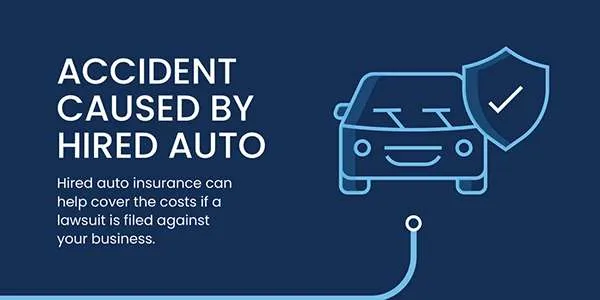In the complex world of commercial insurance, understanding the granular details that differentiate one policy from another can be daunting. This is especially true when it comes to a crucial component for many small businesses—hired auto coverage. Whether it’s a part of your daily operations or a benefit offered to your employees, hired auto insurance is the safety net you don’t want to unpick.
Navigating the terms, options, and coverage details require clear explanations and the ability to sift through jargon to find what truly matters. This blog post aims to demystify hired auto coverage, ensuring that every small business owner is equipped to make informed decisions that not only protect their company but also add value in the most unexpected of circumstances.
What is Hired Auto Coverage?
Hired auto coverage is an add-on to general liability policies that may protect your business when employees or non-owners drive a vehicle owned or rented by the business. It’s like a glove compartment filled with legal and financial aid tailored to incidents involving business operations and vehicles.
You might be wondering, “Do I really need this?” The short answer is “probably.” Even if your business operates without a single business-owned vehicle or chauffeurs-for-hire, the situation can change quickly. For most small businesses, the answer isn’t “yes” or “no”—it’s “you do, if…” and that’s what we’re here to clarify.
Who Needs It and Why?
Imagine contracting a weekend delivery van for a special promotion, or having employees drive rental cars to a trade show. In these instances, where “your” vehicles are actually someone else’s, the coverage in your standard commercial liability policy may not apply. Here’s where hired auto coverage steps in, ensuring comprehensive coverage for liability associated with these non-owned vehicles under the employer’s name.
If an accident occurs, you want to be certain that your insurance covers the financial responsibility that comes with employee-driven rented or borrowed vehicles. Not having this coverage can result in unexpected costs, delays, and potentially serious legal disputes.
Businesses that might need this coverage include:
- SaaS companies with sales or support staff flying to other cities and renting cars.
- Catering businesses using commercial vans occasionally for large orders.
- Marketing agencies that might rent vehicles for promotional events.
- Local retail with occasional direct-to-home delivery services, using hired drivers and cars.
The question is not just whether you’ll need this coverage, but how comprehensive it should be. Deciding factors include the frequency of vehicle use and the potential risks associated with those trips.
Common Scenarios Where Hired Auto Coverage is Essential
Vehicle Rentals for Business Travel
Say you need to send an employee to another city for a big pitch. If they’re renting a vehicle for this, your hired auto coverage ensures that any accident-related liabilities are covered under your business policy.
Occasional Use of Rented Vehicles for Deliveries or Transport
A short-term vehicle lease to handle a sudden surge in business demands or a one-time delivery can become a liability. With hired auto coverage, you’re protected from the damages the vehicle may incur.
Temporary Transportation for the Business
Sometimes, your regular business vehicle may be down for repairs. Renting a temporary vehicle is a logical solution, but ensuring it’s covered through hired auto insurance is a wise precaution.
Employees Using Personal Vehicles for Business
In cases where employees are not using a company car, any accidents that occur during business activities could pose a liability. Hired auto coverage can help plug the gap in such instances.
By ensuring these scenarios are covered, you can safeguard against major losses and potential business disruption caused by auto accidents.
Key Components of a Hired Auto Liability Insurance Policy
Liability Coverage
This will pay for bodily injury and property damage claims against your business if you’re responsible for another person’s injury or vehicle damage.
Collision Damage Waivers (CDW)
When a rented vehicle is damaged, the rental company may waive damages if you purchase a CDW at the time of rental. Hired auto insurance can reimburse you for these waived damages.
Comprehensive Coverage
This covers non-collision-related damage, such as theft, natural disasters, or vandalism to a hired vehicle.
Uninsured Motorist Coverage
This protects you when an employee is in an accident with another driver who is at fault and does not have insurance.
Medical Payments
This can cover medical expenses for you, your employees, and any passengers, regardless of fault.
Understanding all these components and how they fit into your business operations is the first step in crafting the right hired auto liability insurance policy.
How to Get the Right Hired Auto Coverage for Your Business
Selecting the optimal level of hired auto insurance requires insight into your business, its vehicle needs, and the potential risks involved. Here are essential steps to ensure you’re getting coverage that matches your business:
1. Assess Risk
Look at the frequency and types of instances your business might need hired auto coverage for. From daily deliveries to annual out-of-town trade shows, the spectrum of possible risks is vast.
2. Review Your Current Insurance
Understand what your general liability policy already covers and where the gaps are. This is where hired auto insurance can complement and extend your existing coverage.
3. Calculate Potential Costs
Consider the potential financial impact of an accident involving a non-owned vehicle used for business purposes. Getting coverage that aligns with this risk can save you significant financial headache down the road.
4. Shop Around for Quotes
Like any insurance, not all policies are created equal. Reputable insurance providers that offer commercial coverage should be able to provide quotes tailored to your specific needs.
5. Read the Fine Print
A careful review of any insurance policy is a must. Understand all aspects of the coverage, including limitations and exceptions, so you’re clear on what’s protected and what’s not.
Tips for Maximizing Your Hired Auto Insurance
Be Precise in Reporting
Ensure all vehicles used in business operations are reported correctly. Providing incomplete or inaccurate vehicle details can lead to denied claims.
Keep Your Records Updated
Any changes to your business, such as renting a new vehicle or changing drivers, should be immediately updated on your policy to keep it current and applicable.
Regularly Review and Adjust Coverage
Business needs change. Periodic reviews of your hired auto insurance can help you adjust coverages and limits to match your evolving needs.
Consider Package Policies for Savings
Some insurance providers offer package deals that could include hired auto coverage with other types of commercial insurance, potentially lowering your overall cost.
Final Thoughts
Hired auto coverage is an invaluable asset for any small business that uses vehicles not owned by the company. By understanding its importance, assessing your specific risks, and securing the right coverage, you’re taking a decisive step in protecting your business and its operations.
The cost of hiring auto coverage is a fraction of what you could end up paying in the event of a claim if you were found liable without adequate insurance. Don’t take chances with your business’s financial security—invest in hired auto coverage today and drive with confidence that you’re covered, no matter whose wheels are rolling.
With this comprehensive primer, you’re now better equipped to not only understand hired auto coverage but to use it to your business’s benefit. Effective risk management is at the heart of any successful small enterprise, and hired auto insurance is a critical tool in that toolkit.
If you haven’t already, it’s time to speak with an insurtech specialist or your insurance provider about customizing a hired auto insurance plan that suits the unique demands and dreams of your small business. Remember, it’s about prevention as much as protection, and the conversation you start now could save you a world of trouble tomorrow.

